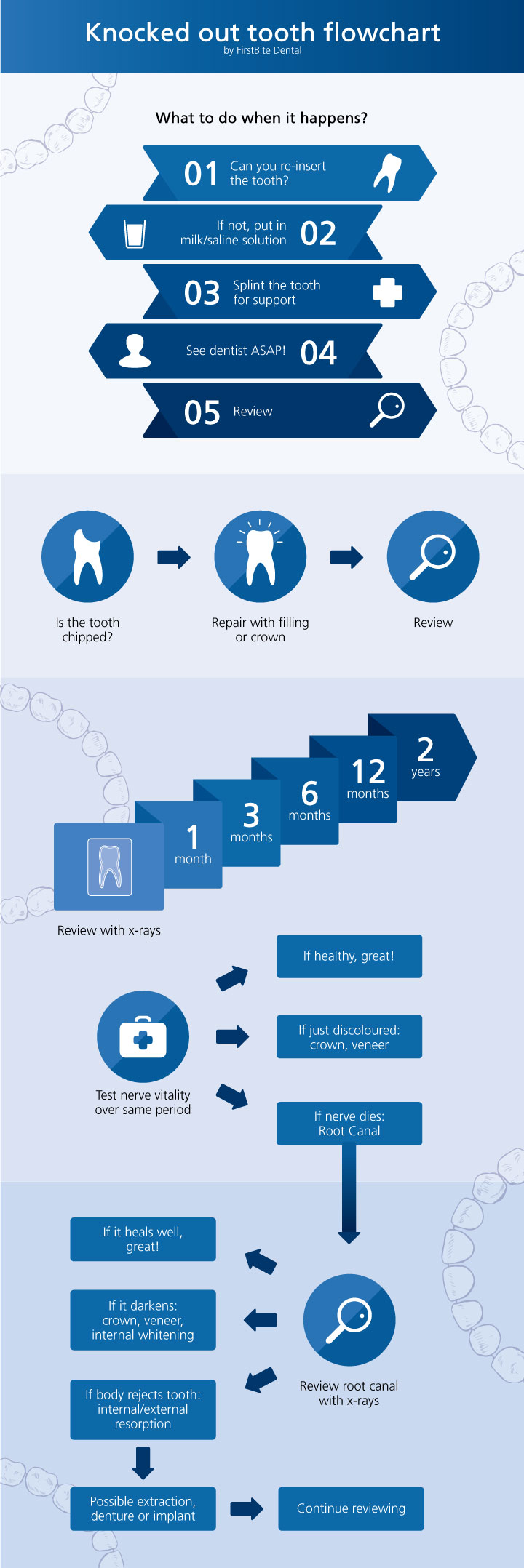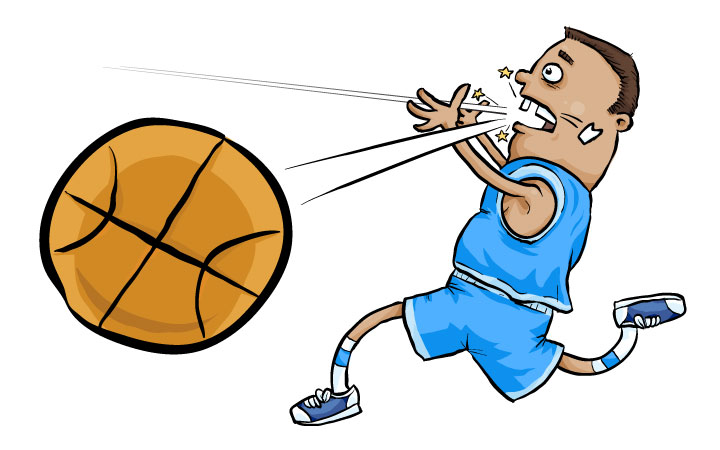With hockey sticks swinging and the footy season underway, do you know what to do if someone were to lose a tooth or have it chipped in an accident? Although our teeth are the toughest part of our body, in fact one of the hardest biological substances known to man, they are still susceptible to damage when enough force is applied. Knowing what to do in a dental emergency can save your smile and also a lot of extra dental work.
Here are some first aid steps to take when a tooth is knocked-out:
- Pick up the tooth holding the crown, do not touch the root.
Locate the tooth as soon as you can. The tooth should be handled only by the crown (the smooth white part for biting). Do not touch the root (the yellowish pointy part that was inside the gums) as it can be easily damaged.
- If dirty, gently rinse the tooth with saline solution or milk. Do not scrub.
Examine the tooth and rinse if there is dirt or other foreign matter on it. To do this you can use milk or saline solution, which can be found in most first aid kits. Eye drops or contact lens solution can also be used in place of saline solution. These liquids have a stable pH level, whereas anything else is more acidic or alkaline. Do not scrub or scrape the tooth.
- Put the tooth back in place.
If the person is conscious you should immediately replace the tooth. To put it back in place, you will need to use the other teeth as a guide and make sure the tooth is facing the right way.
- If this cannot be done, store the tooth in milk or saline solution.
If the tooth can’t be replaced the best solution is to store the tooth in milk or saline solution. Otherwise wrap it in cling wrap or place it in the patient’s mouth next to the cheek. This will keep the bony attachment cells on the tooth alive and increase the chances of success.
- Get to the dentist! (within 30 minutes)
Time can be critical in a dental emergency. Getting to the dentist for an emergency appointment within 30 minutes of the incident will allow the best chance of saving the tooth.
- Monitor the individual for the next 24 hours.
If someone has experienced an impact with enough force to knock out a tooth, it is quite possible that they may have concussion as well. Be aware that this may not be evident right away and symptoms of concussion may not present themselves until some time after the injury. Stay with the person and keep an eye on their mental awareness and watch out for symptoms like vomiting and dizziness. Try to keep them awake for a while to see if their condition deteriorates.
Can a knocked-out tooth always be saved?
The ligament connecting the tooth to the bone can heal over time once the tooth is back in place, provided action was taken quickly. It may need a crown as it darkens and bruises. When a tooth is knocked out, nerves, blood vessels and other tissues are damaged also. As nerves and blood vessels cannot always be repaired, a root canal may be required. Bone grafts, dentures, implants and crowns are all possibilities. Even so, it is possible that the body will reject the tooth and it must in this case be extracted. The state of the re-implanted tooth must be monitored over the life of the patient. A knock from a fall as a child may cause many issues in the future, including TMD (Temporomandibular Joint Disorder) as the jaw can also be damaged.
Are you more likely to chip a tooth or have it knocked out?
It is more likely to be chipped. Tooth enamel is in factone of the hardest organic substances on earth. It consists 96% of the mineral form of Calcium Phosphate known as Hydroxylapatite, making it harder than steel! It is however, a lot more brittle. So, while our teeth are extremely hard and can exert about 80kg worth of pressure, you should think twice before using them as a tool to open a beer bottle or tough packaging.
Can a dentist stitch up cut gums?
Yes, we can. Our practice is fully prepared to perform a range of surgical procedures and sedate patients if necessary.
What should we expect with an emergency appointment?
Just the other night a kid fell over and we stayed back to see them. We put the tooth back in place. If we are at work, we will always see them. Mum brought in the tooth in milk.
Why should we call FirstBite Dental first?
Having multiple dentists in the practice at any one time means that there is always a good chance that a dentist can see you promptly.
Flowchart showing the emergency procedures for a knocked out tooth
Here are some of the steps to take after a tooth has been knocked out, and a breakdown of the process after you come to see us.

What to do if your tooth is knocked out?
1. Can you re-insert the tooth?
2. If not, put it in a milk or saline solution.
3. Splint the tooth for support.
4. See dentist ASAP!
5. Review these instructions.
Is the tooth chipped? > Repair with filling or crown > Review.
Review with X-rays.
• 1 month
• 3 months
• 6 months
• 12 months
• 2 years
Test nerve vitality over same period.
• If healthy, great!
• If just discoloured, veneer.
• If nerve dies: root canal.
Review root canal with X-rays.
• If it heals well, great!
• If it darkens: crown, veneer or internal whitening.
• If the body rejects tooth: internal or external resorption. > Possible extraction, denture or implant. > Continue reviewing.
